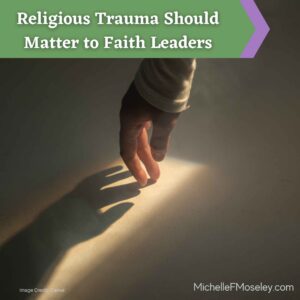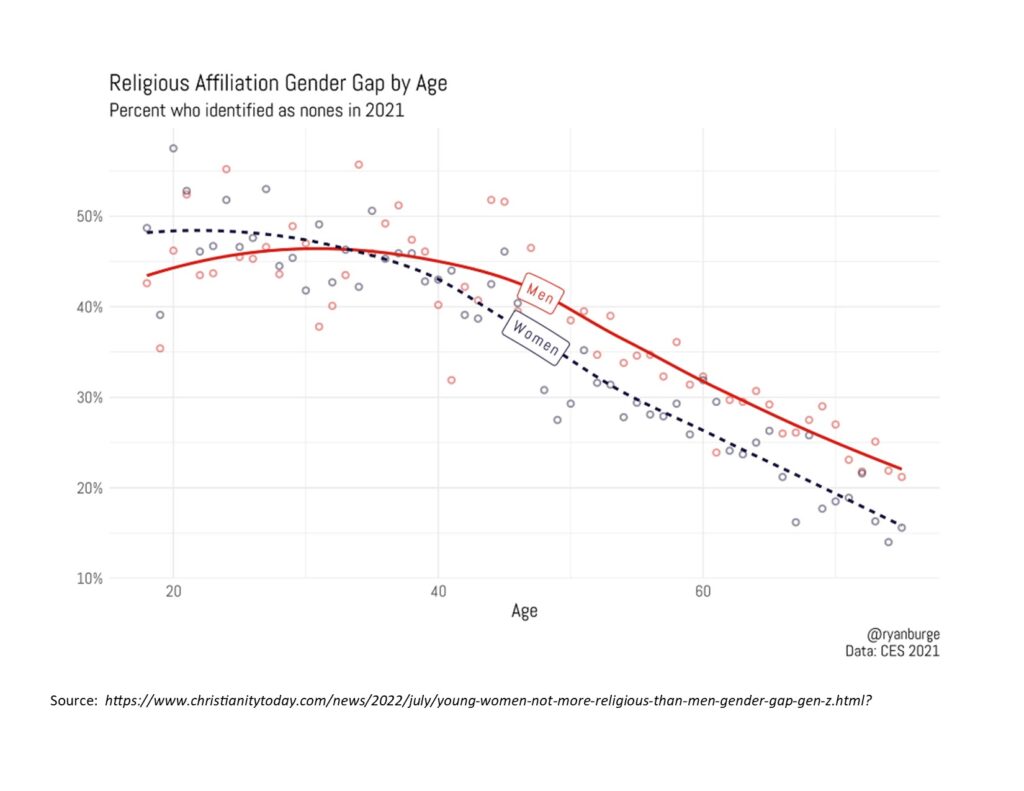Faith leaders, those who hold positions of leadership within churches and other faith-based organizations, would be well-served by increasing their knowledge of religious trauma. Understanding trauma, and religious trauma in particular, could help faith leaders create spaces that are able to be responsive to trauma and offer increased safety to trauma survivors.
Some survivors of religious trauma or spiritual abuse no longer want to be involved with faith or spirituality in any capacity. However, many who have experienced religious trauma or spiritual abuse long for a church or other faith-based space where they can connect with community and God in ways that are sensitive to their trauma-impacted nervous systems.

What About Those Who Want to Stay?
I have spoken with many survivors of religious trauma who spent years seeking a faith community where they felt their pain was understood and where they experienced freedom to engage in ways that felt safe for them without being pushed toward particular activities or ways of being in the space. Personally, I spent years following my religious trauma attempting to find a church where my experience was believed and my presence felt welcome. This is not only my story, but the story of thousands of other survivors of religious trauma or spiritual abuse.
Most of these survivors reach a point where their faith is shattered and they are exhausted from working so hard to find a place where they are welcome in their journey of healing. The very place (i.e. church) and people who survivors hope can be understanding and compassionate have become synonomous with judgment and pain. And, for many survivors that find themselves at that point, they stop trying so hard, stop showing up at services or events, and slip into the category of “nones.”
Who are the “Nones”?
Gallup (the survey people) does polls related to religious beliefs. Those who do not have any sort of belief or religious involvement are labeled in the results as “nones.” They fit into none of the other categories.
A recent article from Christianity Today looked at how the number and disbursement of “nones” has changed over time. The most recent data – from late 2021 – shows that less than 50% of adults in the United States endorse any type of religious affiliation. These same results also show that approximately 40% of adults between 45-55 never attend any type of religious service.

And the most surprising results may be those regarding the involvement of women in religion. Both research throughout the years and anecdotal evidence has shown that women have tended to be more involved with religion than men. Many smaller churches acknowledge they would not have survived without the involvement and service of women.
Yet, for the first time in the history of records being kept, women in the United States are less likely to be involved in church than men. Of folks born in 2000 or later, often referred to as Gen Z, women are more likely than men to identify as “nones” – no religious affiliation and no religious involvement.
What Does that Have to Do with Religious Trauma?
These stats leave me to wonder how many of the folks who fit into the “nones” spent time longing to find a place to belong, worship, and/or serve. So many folks have felt rejected by the church (read more here), and many of those individuals eventually become “nones.”
I’m curious how many of the folks who were once committed to their faith have found more compassion and acceptance in other spaces than they found within faith-based spaces.
I wonder how many of these folks are part of the LGBTQ+ community and/or care about someone who is, and can’t reconcile the vitriol of many faith-based groups toward LGBTQ+ folks with the loving deity those groups claim to represent.
I wonder how many of the now “nones” reached out to a leader or expressed a need to their church, and were not acknowledged or even provided an opportunity to speak with someone and get support.
The statistics regarding women do not come as a surprise for me. I think about how many women I have spoken to who were pushed to the sideline or completely overlooked within a church based on their gender. I think of the 100s of women (yes, that many just from personal conversations) who come to my mind who longed to be part of a faith community and to serve with their talents, yet were told they could not do that simply because they are a woman.
And I think of the number of these women who still long to find a faith-based space that understands their experience and is both trauma-informed as well as responsive to the impact of trauma on individuals.
So many folks have experienced rejection, spiritual abuse, and religious trauma along their path to figuring out their spirituality. What would the statistics in the aforementioned surveys look like if faith-based spaces were led by those who were educated about trauma and committed to being a trauma-sensitive space?
What Can Faith Leaders Do?
Faith leaders have lots of ways to become more trauma-informed, that is, to increase the knowledge that one has about trauma.
Here are some books that speak to trauma from various perspectives:
- The Body Keeps the Score: Brain, Mind, and Body Healing of Trauma – Bessel van der Kolk, M.D. (a more dense and clinical read)
- Trauma in the Pews: The Impact on Faith and Spiritual Practices – Janyne McConnaughey (updated look at how trauma, particularly childhood trauma, shows up within spiritual practices)
- Post-Traumatic Church Syndrome – Reba Riley (memoir-type account of one woman’s journey to find healing)
- Torn – Justin Lee (combo of memoir and practical guidance around the “evangelical vs. gay” debate; recommended by members of the LGBTQ+ community)
Some podcast recommendations:
- Bodies Behind the Bus (Episodes include survivors sharing their own stories, as well as some experts discussing religious trauma and spiritual abuse.)
- Full Mutuality (Episodes explore inequality and injustice in areas of religion, culture, and society.)
- The Rise and Fall of Mars Hill (Series follows the founding and downfall of Mars Hill in Seattle, including stories from staff and attendees.)
For Faith Leaders Looking to Go Further
I’m going to speak directly to those who are in leadership positions within churches or other faith-based organizations. Being trauma-informed is not the same as being responsive to the ways that trauma shows up in your church or organizations.
You have an opportunity to truly embody compassion, grace, and love within the groups you lead. You are in a position to change the culture of those groups and spaces. When you become more aware of how trauma impacts your people (and it does, I promise), you can incorporate that awareness in how you lead and into the policies and practices of your church or organization.
As a trauma therapist who specializes in working with survivors of religious trauma, I would be honored to help you learn and take steps to create a trauma-sensitive and responsive environment. Read on for some options of how you can work with me:
RELIGIOUS TRAUMA SEMINAR FOR FAITH LEADERS (in-person) – I will be facilitating a seminar about trauma, and religious trauma in particular, on May 12, 2023. This in-person event will take place in central NC, and you can head on over to this page for all the details and to begin registration.
RELIGIOUS TRAUMA SEMINAR FOR FAITH LEADERS (online course) – I hope to have an online course that will cover topics related to trauma in faith-based spaces available by late 2023 or early 2024. If you are interested in being updated when that course is ready, head over to my contact form and let me know.
ONE-ON-ONE CONSULTATION – I offer consultation to faith leaders regarding concerns around trauma and how to be more trauma-sensitive within your church or organization. I can also consult with faith leaders around other issues related to mental health. If you’re interested in learning more about this, fill out this contact form to let me know and I’ll get back to you with more details.
MENTAL HEALTH RELATED EVENTS FOR YOUR GROUP – I am passionate about sharing information with others, and am eager to discuss with you how I might be able to provide information to your group around topics related to mental health. Possible topics could include being trauma-informed, recognizing depression or anxiety in teens, or general education regarding mental health. If this is of interest to you, please fill out this contact form and I’ll be in touch to discuss what would be the best fit for your group.
SEEK YOUR OWN MENTAL HEALTH SUPPORT – Being a leader is hard! Leading within a faith-based space can often come with multiple demands on your time and energy, as well the need to carry the concerns of many people. Not to mention any type of preparation and/or speaking that’s involved. I encourage you to care for your own mental health and find support to help you do so. Talking with a licensed mental health professional can be helpful even when things are going okay, and can be necessary when you start to feel the effects of life on your overall wellness. If you’re looking for a mental health provider, I would be happy to assist you in finding a good fit. I have some availability to see folks who are located in NC, and I have a network of colleagues throughout the US. So, if you’re interested in learning what working with a mental health professional might look like, complete this contact form and I’ll be happy to follow up.
Michelle F. Moseley is a Licensed Mental Health Counselor in NC. She believes ALL people deserve respect, compassion, and access to mental and physical healthcare. Michelle specializes in working with survivors of religious trauma and with those who have body image concerns, finding there is frequent overlap in these areas. You can learn more about Michelle by visiting her website at MichelleFMoseley.com or following her on Instagram – @therapy_with_michelle
